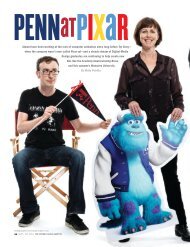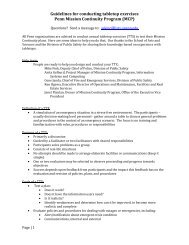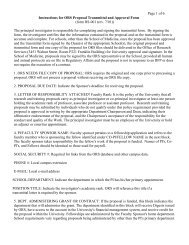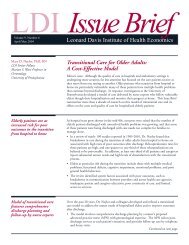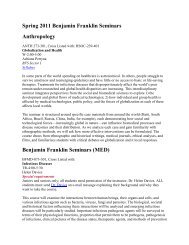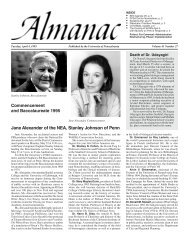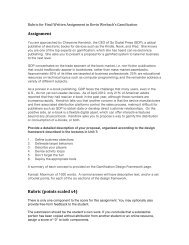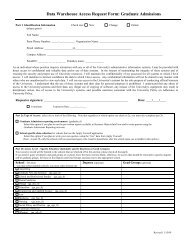No. 3 September 13, 1994 - University of Pennsylvania
No. 3 September 13, 1994 - University of Pennsylvania
No. 3 September 13, 1994 - University of Pennsylvania
- No tags were found...
You also want an ePaper? Increase the reach of your titles
YUMPU automatically turns print PDFs into web optimized ePapers that Google loves.
and the crucibles <strong>of</strong> a society’s art and culture. And so it remains today.Within a five-mile radius <strong>of</strong> this campus, you will find a world-class artmuseum, a renowned orchestra, a marvelous zoological garden, a celebratedplanetarium and natural history museum—as well as a superb five-starFrench restaurant, a remarkable store called Zipperhead and some <strong>of</strong> thefinest comedy clubs in the country. Philadelphia is also the place where thetwo most important documents in American history—the Constitution andthe Declaration <strong>of</strong> Independence—were debated, drafted and signed.But also within a five-mile radius <strong>of</strong> this campus, you will find communitieswhere unemployment is high, where housing is deteriorated, and wherechildren struggle to escape from poverty and neglect. You will find neighborhoodswhere infant mortality is higher than in many underdeveloped countries,where drug use is commonplace and where the underground economy <strong>of</strong>fersmore enticements to the young than any legitimate opportunities. Yes, inPhiladelphia, you will see the most vivid <strong>of</strong> contrasts between high cultureand devastating poverty. And yet both are part <strong>of</strong> Penn. The city’s culturewill <strong>of</strong>ten entice us away from our academic endeavors to share in its diversionsand delights. But the city’s desperate problems will also call out to us,challenging us to use our knowledge and energies to help. Here at Penn, youwill find many opportunities to make Philadelphia your playground. But youwill also have the chance to join others in putting the <strong>University</strong>’s intellectualresources to work in finding solutions to urban dilemmas.There is one more important quality that attracted me to Penn and drewme back. Penn has always been for me a place where ideas generated tremendousexcitement, and where intellectual and social life flowed togetherseamlessly. It was the place where I learned to think well, to be bold andtake chances, to challenge old paradigms. It was, above all, a place deeplycommitted to the open and free expression <strong>of</strong> new ideas <strong>of</strong> all kinds. Asyour president, I am committed to maintaining that kind <strong>of</strong> intellectualenvironment. I invite you—I urge you—to search for and discover newideas at Penn, to pursue them with rigor and discipline, and to engage invigorous debate with your pr<strong>of</strong>essors and your fellow students. But I alsoask for your help in making Penn a place where such spirited debate iswelcome, and where each member <strong>of</strong> our community is accorded respectand dignity in the expression <strong>of</strong> his or her viewpoints.The challenges <strong>of</strong> living together are urgent tasks for which you mustuse these years to prepare yourselves. We live, here on campus and in ourlarger society, with the tensions <strong>of</strong> groups and individuals who see thingsdifferently—not better or worse, just differently. An essential part <strong>of</strong> thePenn experience—as it must be for any adequate undergraduate educationtoday—is learning to explore those differences and communicate acrossthose boundaries.Perhaps most challenging <strong>of</strong> all is that you must refuse to be co-optedby old problems that will prevent you from finding new solutions. You mustlearn, here at Penn, to break down the assumptions and myths that we alluse to interpret reality. Sometimes you will find yourselves challenging theassumptions and interpretations <strong>of</strong>fered by others—your fellow students andyour teachers. But you will find your college years most useful if you spendequal time questioning your own assumptions and attitudes as well. Only ifyou take that crucial step <strong>of</strong> self-exploration can the Penn experience leadto personal as well as academic or pr<strong>of</strong>essional excellence.Make the most <strong>of</strong> this opportunity, for the world we live in is plaguedby the intractable problems <strong>of</strong> hatred, violence, absolutism, and cruelty.Whether we look at our own nation or around the world, we see symptoms<strong>of</strong> the same phenomena. Even Penn’s idyllic academic park has not beenimmune from some <strong>of</strong> these tensions.But it is critical to recognize that the actions and emotions <strong>of</strong> hatred donot stop even at racial or national boundaries. White Europeans are killingeach other in the former Yugoslavia. Black Africans are killing each otherin Rwanda. <strong>No</strong>rth and South Koreans are dancing on the edge <strong>of</strong> nuclearholocaust in East Asia. Hatred knows no boundaries. And racial or ethnicor national identity does not guarantee one’s safety.Here at Penn, you will have an opportunity to discover in yourselveswhat it will take to explore such difficult problems and find new solutions.You will have to solve them to survive in this world, and to help the worldsurvive—so seize that opportunity.Getting the most out <strong>of</strong> Penn’s special community requires a willingnessto take risks and bear the uncertainties that always attend the pursuit <strong>of</strong>excellence. It requires that we commit ourselves now and for the next fouryears to being fully participating members <strong>of</strong> the Penn community—in theclassrooms and in the residences, on Locust Walk and Franklin Field, inthe integrity and intellectual honesty with which we perform our academictasks, and in the personal honesty and integrity <strong>of</strong> our behaviors towardsothers. The issue <strong>of</strong> integrity is so central to us that the provost has chosento emphasize it in his comments this evening.You and I are new together. We can, if we work together, if we commitourselves fully to Penn and our new lives here, create new opportunities forunderstanding, new ways <strong>of</strong> interacting, new possibilities for our campuscommunity and for our nation, and in the end, new knowledge for ourselvesand for the world. As newcomers at this special moment in the life <strong>of</strong> agreat university, a university that has <strong>of</strong>ten broken new ground in its ownpursuit <strong>of</strong> excellence, we can ask no less <strong>of</strong> each other.But it will take all <strong>of</strong> our individual energy and commitment, all <strong>of</strong> ourcollective passion for excellence, all <strong>of</strong> our personal integrity, and all <strong>of</strong>our willingness to serve and to try new ideas. Together we can show howthe Penn community will lead the way.Join me in trying.* * *<strong>No</strong>w it is my pleasure to introduce another Penn freshman, ProvostStanley Chodorow. For many <strong>of</strong> you that will prompt the question, “Whatis a provost?” Having myself been Provost at Yale until just a few monthsago, I can tell you that the Provost is Penn’s chief academic and studentaffairs <strong>of</strong>ficer. He is also the person ultimately responsible—with each <strong>of</strong>you—for the quality <strong>of</strong> the undergraduate education you will receive, andhe and I plan to make that one <strong>of</strong> our major priorities. In that effort, youwill see that the Provost and I are partners, working together with you andyour deans, as members <strong>of</strong> a single team and a single, special community,to achieve our common goals. So I am especially happy to introduce Penn’snew Provost, Stanley Chodorow.“You are on a steeply rising ramp...” by Stanley ChodorowPresident Rodin is beginning again at Penn. I’m like you; I’m beginning,plain and simple. We’ll learn how to get around the place together, and ifyou have a decent sense <strong>of</strong> direction you’ll figure out how to get from hereto there much faster than I. If you see me on campus looking lost, pleasetake me in hand and point me in the right direction.As President Rodin said, I am responsible for the academic programs andthe student life in the <strong>University</strong>. Actually, the responsibility for academicprograms does not give me the authority to create and manage all <strong>of</strong> theparticular programs you will be taking; that is the province <strong>of</strong> the faculty anddeans <strong>of</strong> the various schools. And the responsibility for student life doesn’tmean that I organize the parties; I don’t think you’d like my sort <strong>of</strong> parties verymuch. I help the faculty and those who work in what we call here “<strong>University</strong>Life” make the critical choices that determine how the <strong>University</strong> does itsacademic business. What we do for you outside <strong>of</strong> class is connected withwhat we do in class. The academic purposes and functions <strong>of</strong> the <strong>University</strong>are the center and justification for everything we do.So I’ll say something about what we hope you will get and what you canexpect from your academic experience at Penn. I want to make three pointsabout your education. The first is about what Ben Franklin (I hope you likeBen; you’ll hear a lot about him around here) called the ornamental and thepractical. The second is about the standards to which we will hold you. Thethird is about your part in your education and what that part entails.Penn is unique in American higher education because it seeks to unitetwo usually separate goals and types <strong>of</strong> education—the theoretical (whichis what Ben called the ornamental) and the practical. If you survey the landscape<strong>of</strong> American colleges and universities, you will find some devoted toliberal education—following the old European idea that theoretical studiesare the basis <strong>of</strong> true education—and some to practical arts—the Americantradition <strong>of</strong> the land grant universities. Long before the idea <strong>of</strong> the landgrant college occurred to anyone, Ben, the founder <strong>of</strong> Penn with whom youcan sit and chat on the bench along 37th Street, saw that all practice wasinformed by theory, even if the practitioners didn’t recognize the fact, andhe set out to found an institution that would unite theory and practice in itsprograms. Welcome to that institution, more than 250 years later. The ideahad staying power.Many <strong>of</strong> you came to Penn because it <strong>of</strong>fered you an education connectedwith what you understand to be useful studies, and many <strong>of</strong> the rest<strong>of</strong> you will find the lure <strong>of</strong> the practical very powerful as you make yourAlmanac <strong>September</strong> <strong>13</strong>, <strong>1994</strong>



